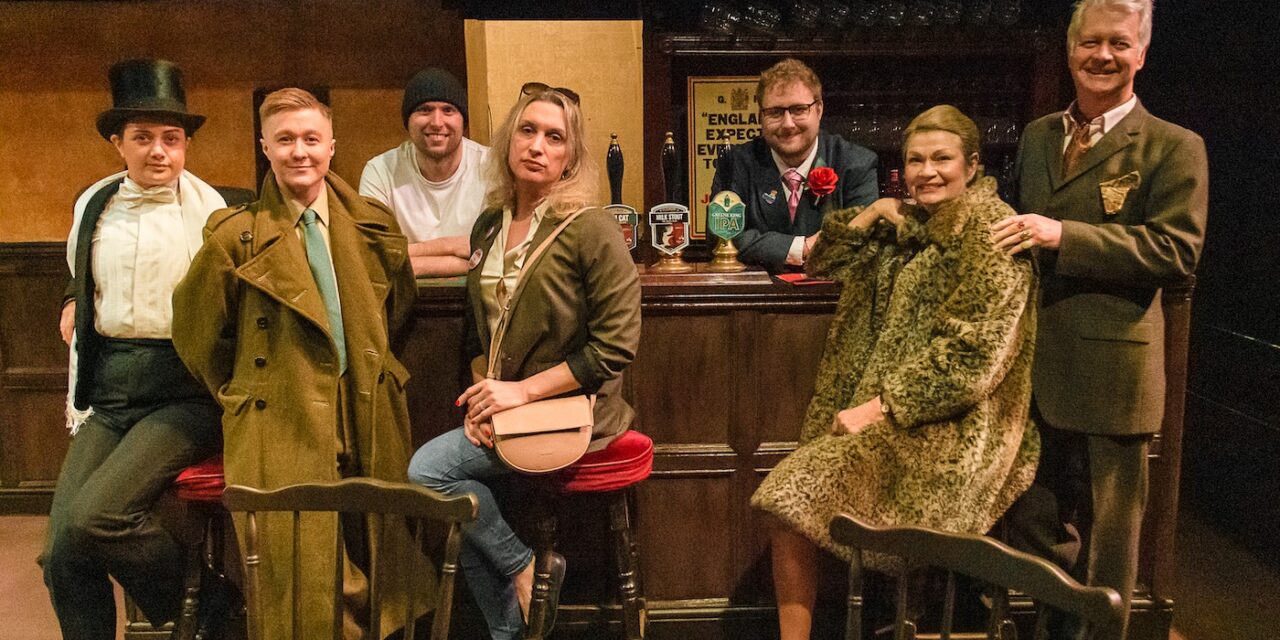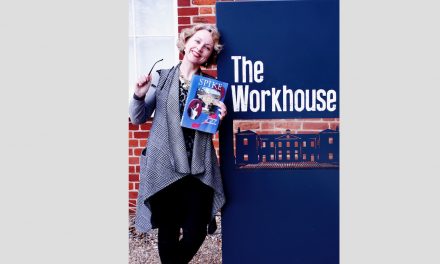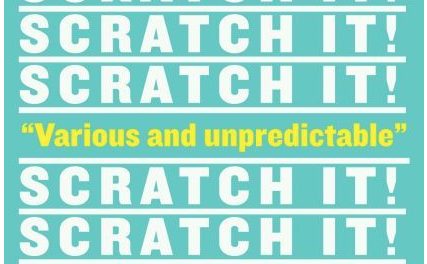The cast of Queers – photo supplied by Sewell Barn Theatre
Queers originated as a TV drama created by Mark Gatiss in 2017 marking the 50th anniversary of the passing of the Sexual Offences Act 1967. This Act decriminalised homosexual activity, and in doing so allowed a hidden culture to cautiously emerge into the bright light of public awareness, if not acceptance. The vicious laws that were overturned had only ever been used against men, which gives the background to this impressive bit of theatre.
Gatiss curated a number of powerful and moving single actor performances into a theatrical presentation which is gentle, humane, enlightening and informative. For younger audience members it gives a surprisingly detailed analysis of the progress of LGBTQ+ rights over the last century in the UK, a helpful history. The great skill of the writing is that it gives us seven very personal stories which are immediately easy to relate to and empathise with, each one a smack in the face to the tabloid editors, religious zealots and Tory MPs who are forever trying to divide us against anyone who does not fit their narrow definition of sexuality and social custom. Sewell Barn Theatre have modified the original text adding a timely insight into trans history.
The first vignette is from Dean Kenneth as Perce, a First World War soldier who embraces his sexuality in the most awful context imaginable. It is not the horror story that we might expect, but rather a touching story of young love. This sets the tone brilliantly for the whole show. We see Poppy Hiscox elegant and suave as Bobby, a 20s girl who presents as a dandy man, Zanna Foley-Davies as Alice, who seems to accept her life as a woman married to a gay man in 50s Britain. Then we enjoy the camp and Polari-talking Jack (Jonathon Cooke), a dapper tailor who ponders on how the 1967 Act will change his happy trajectory as a camp rent boy and sexual adventurer who has thrived under the illegality before. Each give us a strong performance and a character we cannot fail to engage with or recognise.
Ben Noble gives us the actor Phil, fighting stereotypical casting as an actor in the late 80s when tabloid intolerance found a new vicious voice following the arrival of HIV/AIDS. A low point for Phil is being cast as a token gay man in a soap, called Clive, whose ‘beige’ relationship clearly does not match his own life. His monologue bursts out with anger at the dehumanising treatment of gay men in the press at the time that HIV/Aids was often wrongly termed the ‘gay plague’.
Jen Alexander gives us a character, Vi, not seen in the Gatiss original but giving us an important insight into the life of a woman born male who has struggled to find a life that empowers and fulfils her on her own terms.
The seventh monologue is a witty wedding speech from Steve, to his guests and husband Adam. Seàn Bennett as Steve shows us how much has improved in the century we have sped through tonight, where now we can celebrate marriage between people regardless of gender, while just maybe asking what marriage means too.
The final scene brings all seven actors together for a real world update on just how far we still have to go, where every bit of progress towards tolerance and acceptance seems to be accompanied by another twist of the knife from the church, the press or the state. It perhaps kills the positive mood of the seven monologues, but reminds us of the threats that remain. The last few days have seen the Church of England re-stating opposition to same sex marriage, and the disgusting attempt by the current Tory Government to block Scottish legislation that aims to make life just a little easier for trans people.
This is a brave production for an amateur company, not for the subject matter, but for the style of the drama. A monologue is a demanding task even for the most established of professional actors. To find seven cast members of the skill and quality of this lot is a remarkable achievement. Each actor seems to fit in their role like a nicely tailored glove. The well written scripts by Mark Gatiss, Jackie Clune and others help but the cast all have the right to be very proud of their work. The off stage crew play their parts too, with a modest use of screen images to mark the transition in time from scene to scene, effective lighting and sparing but appropriate use of contemporary music.
It would be easy in a show looking at a century of homosexual intolerance to focus on some of the more unpleasant suffering and abuse, but this show resists that and gives us a positive and life affirming look into real lives full of warmth, tenderness and complexity. The epilogue, delivered by Vi (Jen Alexander) jars us a bit into realising that still attitudes of many people need to change, but the trajectory is much more reassuring than might have been expected when I was young, several weeks ago. (OK decades).
I could not make the first night of the show, so it is nearing the end of a short run now but with performances on Friday and Saturday evening and a Saturday matinee you may just catch it. Make sure you do!
© Julian Swainson, Norwich Eye, 26th January 2023
Queers, curated by Mark Gatiss and directed by Michelle Hutchings is at Sewell Barn Theatre until 28th January 2023
More information and booking details: https://www.sewellbarn.org/index.html





Recent Comments